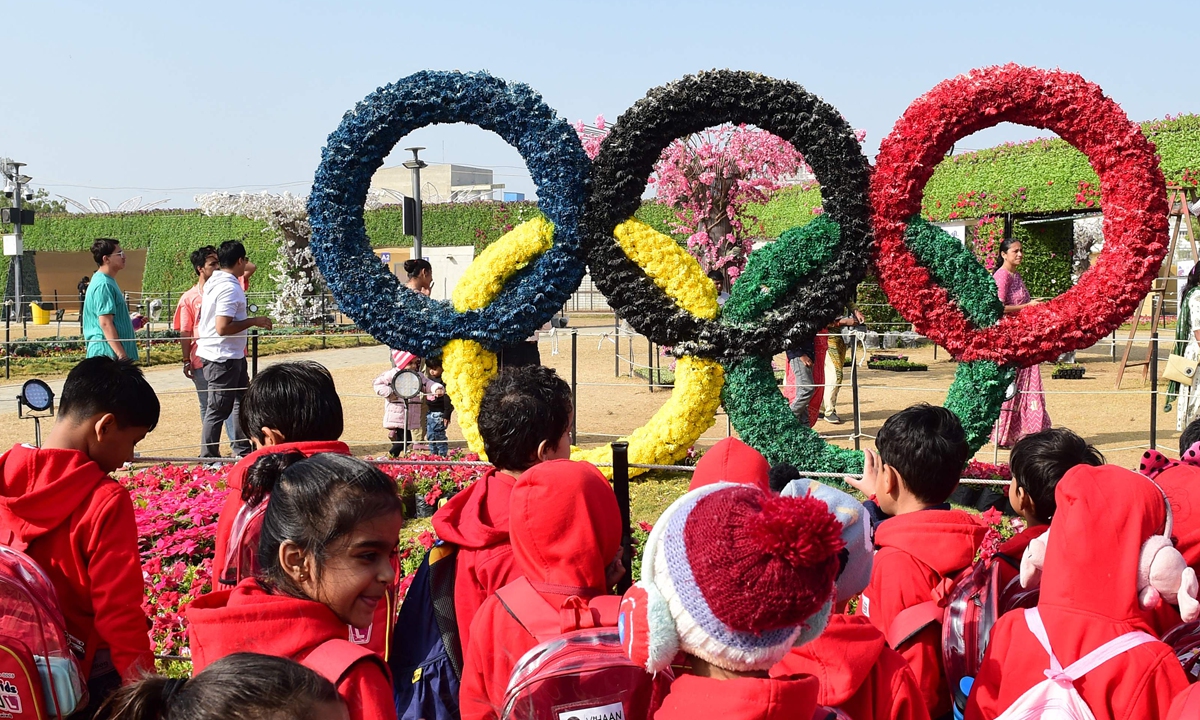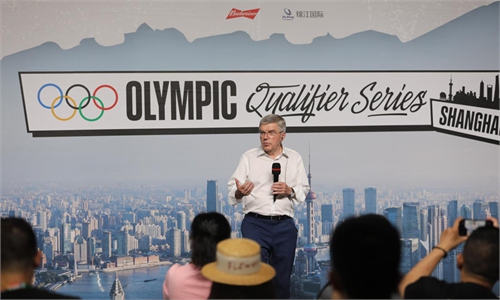SPORT / OLYMPICS
Challenges ahead for a successful Indian 2036 Olympics bid

School children watch a floral display of the Olympic rings at the Vibrant Ahmedabad Flower Show 2024 in Ahmedabad, India on January 6, 2024. Photo: VCG
India has officially thrown its hat into the ring for the 2036 Summer Olympics. President of the Indian Olympic Association (IOA) P. T. Usha said on Twitter the IOA has submitted an official Letter of Intent in early October to the International Olympic Committee (IOC) for hosting the Olympics in India in 2036.Though a location is not yet announced, this move signals India's ambition to join the ranks of countries to host the world's largest multi-sport event, benefiting it's 1.4 billion people.
India's experience in hosting international sporting events is noteworthy. The 2010 Commonwealth Games, though marred with some controversies, indicated the country is able to host large-scale events. India has also hosted the 1951 and 1982 Asian Games. On a smaller scale, India has hosted major single-sport events such as the Cricket World Cup and the Hockey World Cup in 2023.
However, India's road to winning the bid and successfully hosting the Olympics may not be smooth, with a number of challenges standing in the way of success.
Despite being the world's fifth-largest economy and most populated country on earth, India ranked 71st on the Paris Olympics medal table, a result that have disappointed many Indians.
India now joins Indonesia, Turkey, and Chile as the countries that have officially submitted the bid in hosting the 2036 Games. While the country's enthusiasm is admirable, critics are quick to point out concerns regarding India's infrastructure, public health standards, and general preparedness for an event of Olympic proportions.
But if India's Olympic bid is successful, it could lead to infrastructure upgrades that the country has long needed. The experience of other countries, such as China, which undertook significant infrastructure projects in preparation for events like the 2008 Beijing Olympics, shows that hosting the Games often results in long-term benefits for the local population, and their experience could certainly be shared.
Due to a lack of long-term investment, Indian athletes face numerous obstacles, including insufficient funding and a lack of training facilities. If the Olympic Games were to be held in India, the event would likely catalyze an increase in investment in sports and benefit the largest population on earth. However, India has a long way to go in terms of developing its sports industry to match global standards.
At the same time, India's growing interest in sports, as well as its success in certain disciplines, gives reason for optimism. Cricket - India's traditional powerhouse - has already been confirmed as a new Olympic sport for the 2028 Los Angeles Games, presenting the country with an unprecedented opportunity to leverage its sporting success.
In addition, India has established itself as a competitive force in shooting, with impressive performances at the ISSF World Cup Final held in New Delhi.
The bid also holds potential for the development of other sports that have seen rising interest, such as wrestling, boxing and badminton. If India continues to develop its talent pool in sport, it is conceivable that the country may one day challenge dominant sports powerhouses.
Compared with countries like China, India remains a long way from achieving the same level of Olympic success, as the significant challenges India faces in terms of investment in sports infrastructure keep mounting. Still, the bid process itself is likely to act as a catalyst for reform, pushing India's sports organizations to modernize and adopt international standards.
If India's bid is successful, it will not only benefit the country's athletes but also bring new energy to the international sports community.
The author is a reporter with the Global Times. life@globaltimes.com.cn



